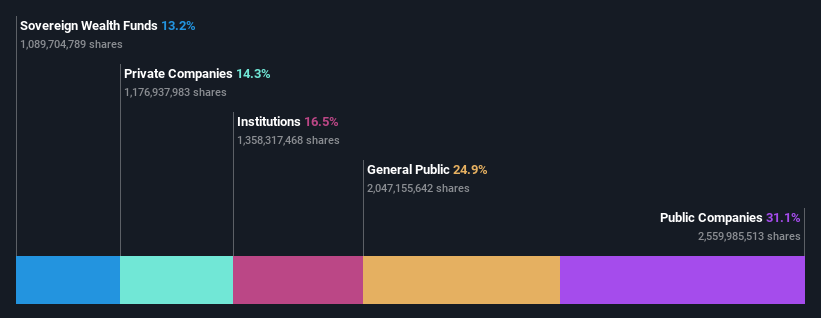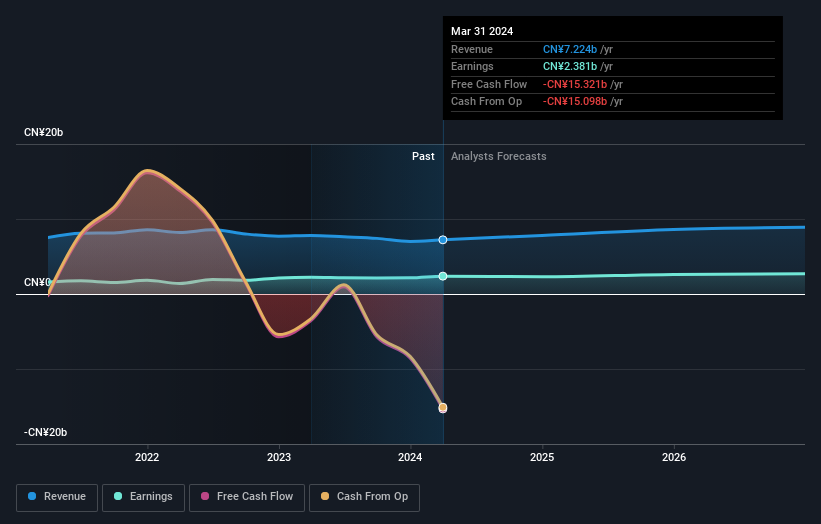- China
- /
- Capital Markets
- /
- SHSE:601901
Public companies among Founder Securities Co., Ltd.'s (SHSE:601901) largest stockholders and were hit after last week's 3.2% price drop

Key Insights
- Significant control over Founder Securities by public companies implies that the general public has more power to influence management and governance-related decisions
- 55% of the business is held by the top 3 shareholders
- Institutions own 17% of Founder Securities
To get a sense of who is truly in control of Founder Securities Co., Ltd. (SHSE:601901), it is important to understand the ownership structure of the business. The group holding the most number of shares in the company, around 31% to be precise, is public companies. In other words, the group stands to gain the most (or lose the most) from their investment into the company.
As market cap fell to CN¥68b last week, public companies would have faced the highest losses than any other shareholder groups of the company.
Let's delve deeper into each type of owner of Founder Securities, beginning with the chart below.
View our latest analysis for Founder Securities

What Does The Institutional Ownership Tell Us About Founder Securities?
Many institutions measure their performance against an index that approximates the local market. So they usually pay more attention to companies that are included in major indices.
Founder Securities already has institutions on the share registry. Indeed, they own a respectable stake in the company. This suggests some credibility amongst professional investors. But we can't rely on that fact alone since institutions make bad investments sometimes, just like everyone does. When multiple institutions own a stock, there's always a risk that they are in a 'crowded trade'. When such a trade goes wrong, multiple parties may compete to sell stock fast. This risk is higher in a company without a history of growth. You can see Founder Securities' historic earnings and revenue below, but keep in mind there's always more to the story.

We note that hedge funds don't have a meaningful investment in Founder Securities. Ping An Insurance (Group) Company of China, Ltd. is currently the largest shareholder, with 29% of shares outstanding. The second and third largest shareholders are Beijing Zhengquan Property Co., Ltd. and National Council for Social Security Fund, with an equal amount of shares to their name at 13%.
After doing some more digging, we found that the top 3 shareholders collectively control more than half of the company's shares, implying that they have considerable power to influence the company's decisions.
While studying institutional ownership for a company can add value to your research, it is also a good practice to research analyst recommendations to get a deeper understand of a stock's expected performance. There are plenty of analysts covering the stock, so it might be worth seeing what they are forecasting, too.
Insider Ownership Of Founder Securities
The definition of an insider can differ slightly between different countries, but members of the board of directors always count. The company management answer to the board and the latter should represent the interests of shareholders. Notably, sometimes top-level managers are on the board themselves.
Most consider insider ownership a positive because it can indicate the board is well aligned with other shareholders. However, on some occasions too much power is concentrated within this group.
We note our data does not show any board members holding shares, personally. Given we are not picking up on insider ownership, we may have missing data. Therefore, it would be interesting to assess the CEO compensation and tenure, here.
General Public Ownership
The general public-- including retail investors -- own 25% stake in the company, and hence can't easily be ignored. While this size of ownership may not be enough to sway a policy decision in their favour, they can still make a collective impact on company policies.
Private Company Ownership
It seems that Private Companies own 14%, of the Founder Securities stock. It's hard to draw any conclusions from this fact alone, so its worth looking into who owns those private companies. Sometimes insiders or other related parties have an interest in shares in a public company through a separate private company.
Public Company Ownership
It appears to us that public companies own 31% of Founder Securities. We can't be certain but it is quite possible this is a strategic stake. The businesses may be similar, or work together.
Next Steps:
I find it very interesting to look at who exactly owns a company. But to truly gain insight, we need to consider other information, too. Be aware that Founder Securities is showing 1 warning sign in our investment analysis , you should know about...
If you would prefer discover what analysts are predicting in terms of future growth, do not miss this free report on analyst forecasts.
NB: Figures in this article are calculated using data from the last twelve months, which refer to the 12-month period ending on the last date of the month the financial statement is dated. This may not be consistent with full year annual report figures.
New: AI Stock Screener & Alerts
Our new AI Stock Screener scans the market every day to uncover opportunities.
• Dividend Powerhouses (3%+ Yield)
• Undervalued Small Caps with Insider Buying
• High growth Tech and AI Companies
Or build your own from over 50 metrics.
Have feedback on this article? Concerned about the content? Get in touch with us directly. Alternatively, email editorial-team (at) simplywallst.com.
This article by Simply Wall St is general in nature. We provide commentary based on historical data and analyst forecasts only using an unbiased methodology and our articles are not intended to be financial advice. It does not constitute a recommendation to buy or sell any stock, and does not take account of your objectives, or your financial situation. We aim to bring you long-term focused analysis driven by fundamental data. Note that our analysis may not factor in the latest price-sensitive company announcements or qualitative material. Simply Wall St has no position in any stocks mentioned.
About SHSE:601901
Founder Securities
Engages in the securities business in the People’s Republic of China.
Questionable track record with imperfect balance sheet.

